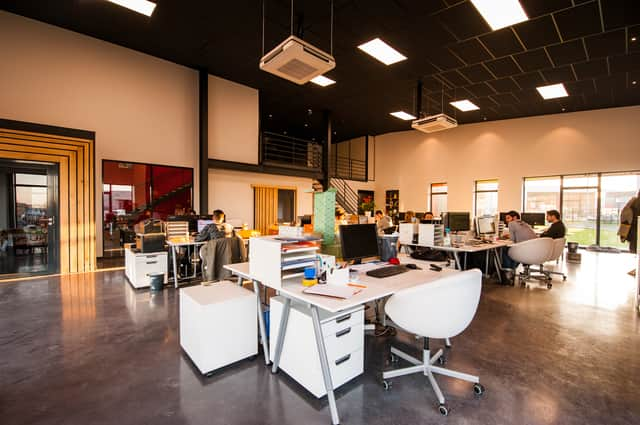Millions of employees think their company is ‘stuck in the past’ when it comes to technology and working practices


A study of 1,500 UK office workers found 31 per cent believe crawling internet speeds are a sign of an old-fashioned office - and a quarter cite out-of-date fax machines as the ultimate sign of being behind the times.
And more than one in five think companies using Microsoft tools like Word or Excel – from 2003 – are stuck in the past.
Advertisement
Hide AdAdvertisement
Hide AdBut it’s not just technology that is leaving some companies trailing as despite huge strides being taken in mental health awareness at work, 49 per cent feel their own company is behind the times when it comes to wellbeing.
A tenth feel their employers still frown upon staff taking personal phone calls, and a little under one in five still have no flexible hours.
A spokesperson for communication solutions specialists Enreach, which commissioned the report, said: “Our research shows how many businesses are in need of a technical upgrade – and seem to be stuck in the 1980s.
“It can be really frustrating to work with old fashioned technology – there’s nothing worse than slow or outdated technology stopping you from doing your job properly.
Advertisement
Hide AdAdvertisement
Hide Ad“But on the other hand, there’s a danger of being too high-tech and confusing staff with systems that end up being problematic.
“The study also found businesses also have lots of work to do when it comes to modernising their attitudes to mental health and general wellbeing.”
The study also found eight in 10 respondents think having out of date tech – and business practices – can seriously hinder company growth.
And 56 per cent feel their job is made much harder than it needs to be, simply by using borderline obsolete technology.
Advertisement
Hide AdAdvertisement
Hide AdLoading....
Half the working day
As a result, nearly half an hour of every working day is ‘wasted’ trying to get their old office equipment to work.
When it comes to flexible working practices, 31 per cent of adults would most enjoy a shorter working week.
Another 23 per cent believe staff should be able to take a ‘wellbeing day’ when they need to recharge their batteries.
And a fifth would like to be able to ‘buy’ more annual leave from their employer, to take a much-needed break.
Advertisement
Hide AdAdvertisement
Hide AdTop should be driving tech
Employees believe the people at the very top of a company – CEO or director level – should be the ones driving change to tech and working practices.
But two-thirds of those polled via OnePoll have never brought anything up to their management about their working environments being stuck in the past.
Enreach’s spokesperson added: “There’s been a growing demand from staff members to see an improvement in ‘quality of life’ for employees.
“As much as it can be a hindrance to use an ancient printer – it’s equally challenging when wellbeing policies are archaic and don’t reflect modern attitudes.
Advertisement
Hide AdAdvertisement
Hide Ad“Happier staff tend to lead to a better quality of product, so it’s in employers’ interests to make sure they’re up to date with all areas of their business.”
To find out how modern your company is, take this this quiz to find out https://enreach.co.uk/news/is-your-business-stuck-in-the-80s-take-the-quiz-and-find-out/
TOP 40 OUTDATED WORKING PRACTISES:
1. Slow internet
2. 9 to 5 start and finish time
3. Not having flexible hours
4. Fax machines
5. Not allowing working from home
6. Paper payslips
7. 25 days of holiday or less per year
8. Fixed lunch hour
9. Dress codes such as wearing suits and ties
10. Filing cabinets
11. Microsoft 2003
12. Landline telephones
13. Boxy computer monitors
14. Pressure around taking time off for appointments
15. Micromanaging + Desk computers instead of laptops
16. Sending letters
17. One temperature setting for the whole office
18. Single-use products such as plastic cups
Advertisement
Hide AdAdvertisement
Hide Ad19. Poor maternity schemes, such as low pay or little time off
20. Working over the Christmas break
21. Set days to be in the office
22. Submitting expenses by hand
23. Poor paternity schemes, such as low pay or little time off
24. In/Out paper trays
25. Overhead projectors
26. Annual employee reviews
27. Hierarchy
28. Attitudes towards recycling
29. Booking meeting rooms on a physical calendar
30. Plug in ethernet cables instead of WiFi
31. Flipcharts
32. Paper – such as using it to make notes in a meeting
33. Not being allowed your personal mobile at your desk
Advertisement
Hide AdAdvertisement
Hide Ad34. Attitudes towards women being in pain during menstrual cycle
35. Not being able to take personal calls
36. Sharing files using a memory stick/external drive
37. Hiring only full-time employees
38. Requesting holidays via email/in person
39. No personal activity during work hours
40. Whiteboards in meeting rooms